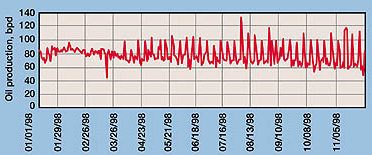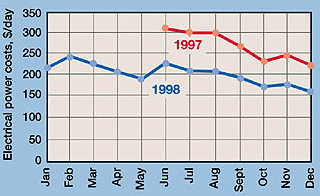How to reduce electrical power costs without sacrificing production rate
How to reduce electrical power costs without sacrificing production rateDavid Coston (uecei1@midwest.net), Coston Energy,
Inc., Carmi, Ill. Bottom line. By installing timers and pumping during off-peak hours, Equinox Oil reduced electrical power consumption in Illinois’ South Albion field by 25%. Operating costs were also reduced by $2,000 per month, without adversely impacting production rates. Payout for the project occurred in one month. The problem. High electrical energy costs have always been a major expense in oil production, especially in mature properties such as Illinois basin waterfloods. The comparatively high cost of electricity ($0.05 to $0.06/kWh), combined with a depressed crude oil market, forced operators into implementing cost reduction programs — some of which were not considered viable in the past. Pumping during off-peak hours. Equinox Oil Co. operates several leases in southern Illinois. In its South Albion field, lifting costs (particularly those related to electrical power) were very high, especially due to the high water-cut production. Electrical power costs alone were about $3.40 per bbl of oil produced. Several years ago, Equinox’s energy consultant, Coston Energy, Inc. (CEI), noted that the electrical rate tariff was structured to promote off-peak power usage. The tariff provided for both a time-of-day and a seasonal discount. Under this tariff, demands created by equipment operated during off-peak periods were not counted toward the billing demand charge. Energy consumed during off-peak periods was discounted by 30% during winter months (October to May) and by 57% during summer months (June to September). Off-peak periods were considered from 9:00 PM to 9:00 AM during the week, plus all day Saturday, Sunday and holidays. As a result of these tariffs, CEI recommended that Equinox install seven-day timers on its pumping units. These would allow wells to be pumped during off-peak hours, keeping pumping units idle during peak hours. Equinox had initially balked at the idea of timers because of uncertainty about reducing oil production. The company was concerned that intermittent pumping might decrease field production, since pumping time would be reduced by 60 hours per week for each well with a timer (five days per week at 12 hour-per-day peak periods). But in March 1998, as oil prices were falling, Equinox decided to experiment with timers. By the end of the summer, timers were installed on 20 wells. The injection pumps run continuously, playing "catch up" while the producing wells are down. This explains why there is still a demand charge on the electricity bill, although reduced from the original levels. Results. Daily production fluctuated, since timers allowed the wells to be pumped only 12 hours per day during the week, Fig. 1. Production rebounded when the wells were pumped 24 hours per day on weekends and holidays. Despite the fluctuations, the average weekly production level did not change appreciably after the timers were installed. The wells produced 569 bbl per week from January through March 1998, and 547 bbl per week from April through November 1998.
As a result of its experiment with timers, Equinox was able to greatly reduce electrical operating costs per unit of production, Fig. 2. While average production remained fairly constant, electrical consumption dropped by an average of 25%. Total electrical costs also dropped by about $2,000 per month. With a cost of $100 per well for the timers, payout was realized in about a month. Equinox has installed timers on an additional 40 wells in the area, bringing to 60 the total number of wells with timers.
The authorsDavid Coston is president of Coston Energy, Inc., which offers energy cost saving services including electric rate and usage analysis, lighting and HVAC system efficiency improvements, and process efficiency upgrades. A registered professional engineer in Illinois and Indiana, Coston holds a BS in electrical engineering from the University of Illinois. Bryan Dicus is district engineer for Equinox Oil Co. in its Crossville, Ill., district. Before joining Equinox, Dicus was with Mobil Exploration and Producing, US, working primarily on production and completion engineering in Kansas and Oklahoma. He holds a BS in petroleum engineering from the University of Missouri-Rolla. Copyright © 1999 World
Oil |
- Applying ultra-deep LWD resistivity technology successfully in a SAGD operation (May 2019)
- Adoption of wireless intelligent completions advances (May 2019)
- Majors double down as takeaway crunch eases (April 2019)
- What’s new in well logging and formation evaluation (April 2019)
- Qualification of a 20,000-psi subsea BOP: A collaborative approach (February 2019)
- ConocoPhillips’ Greg Leveille sees rapid trajectory of technical advancement continuing (February 2019)




